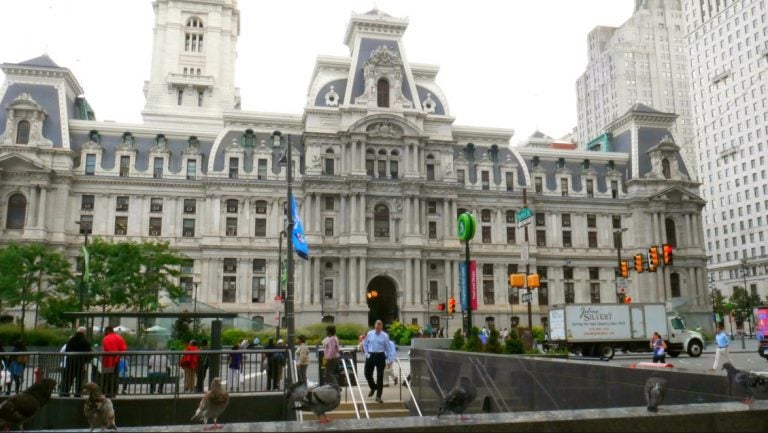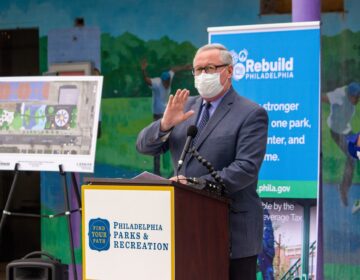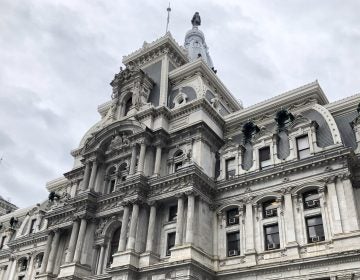Philly Council unveils $5B budget, increases tax break for some homeowners
Philadelphia’s budget is teed up to bust $5 billion for the first time in its history.

Philadelphia City Hall, as it looked Aug. 28, 2017 (Kimberly Paynter/WHYY, file)
This article originally appeared on The Philadelphia Tribune.
—
Philadelphia’s budget is teed up to bust $5 billion for the first time in its history.
City Council put forward its $5,025,266,000 operating budget Thursday with no property tax increase for fiscal year 2020. The spending plan added more than $30 million to Mayor Jim Kenney’s proposed budget, including more funding for the school district.
The legislation was read on first reading along with a bill to increase tax breaks for some homeowners and another to decrease the city’s Wage and Net Profits Taxes.
Council President Darrell Clarke said Thursday “there was a need of additional dollars in certain categories,” such as for affordable housing, and training and job initiatives for formerly incarcerated individuals.
In an email, Kenney spokesman Mike Dunn applauded City Council’s proposed budget and spending changes.
“In short, this budget represents important investments in Philadelphia’s future, and is an example of the sort of progress that can happen when the executive and legislative branches work in good faith, with the needs of residents as the top priority,” Dunn said.
The legislation can be voted on as soon as next week.
City Council has until the end of the month to approve a budget and send it to Kenney. The last scheduled City Council meeting is June 20, after which the 17 legislators are on break until Sept. 12.
City Council’s proposed 2020 budget increases spending by 6% or nearly $300 million over last year. City spending under Kenney has increased every year and is on track to jump nearly $1 billion since he took office in 2016.
Asked what’s driving spending increases, Clarke spokeswoman Jane Roh said in an email: “Revenues are strong so Council feels it is appropriate to make bold investments toward poverty reduction.”
City Council gave $8.4 million more to the School District of Philadelphia than Kenney’s proposed budget, bringing the city’s total contribution for 2020 to $222.4 million.
Other increases included a half million dollars for the Defender Association of Philadelphia, $800,000 for the Office of Homeless Services, and $600,000 for Department of Licenses and Inspections compared to the mayor’s spending plan.
The budget would add approximately 30 new positions to the city’s workforce, 12 of which would be in the Department of Licenses and Inspections, Dunn said. There would be no staff reductions.
While the property tax rate did not increase last year and is not expected this year, some property owners have been feeling the bite of higher taxes.
Property assessments increased 5% citywide this year, which was expected to generate $53 million in new revenue in fiscal year 2020. Last year, property assessments jumped 10.5% citywide on average.
In another bill, City Council proposed increasing the homestead exemption from the current level of $40,000 to $45,000.
The exemption works by reducing the taxable portion of a property’s assessment by that amount. To be eligible for the program, a property owner must use the property as a primary residence. Last year, City Council increased the exemption from $30,000 to $40,000.
Councilman Brian O’Neill, the main sponsor behind the bill, said increasing the tax break will cost the city $14-$15 million a year. But the city’s additional contributions to the school district would ensure the district does not lose out on funding.
O’Neill, a Republican, said he originally sought to increase the homestead exemption to $50,000, but the support in City Council was not there and he came to the lower figure after negotiations with the administration.
“This was a good outcome,” he said.
mdonofrio@phillytrib.com (215) 893-5782
WHYY is your source for fact-based, in-depth journalism and information. As a nonprofit organization, we rely on financial support from readers like you. Please give today.




